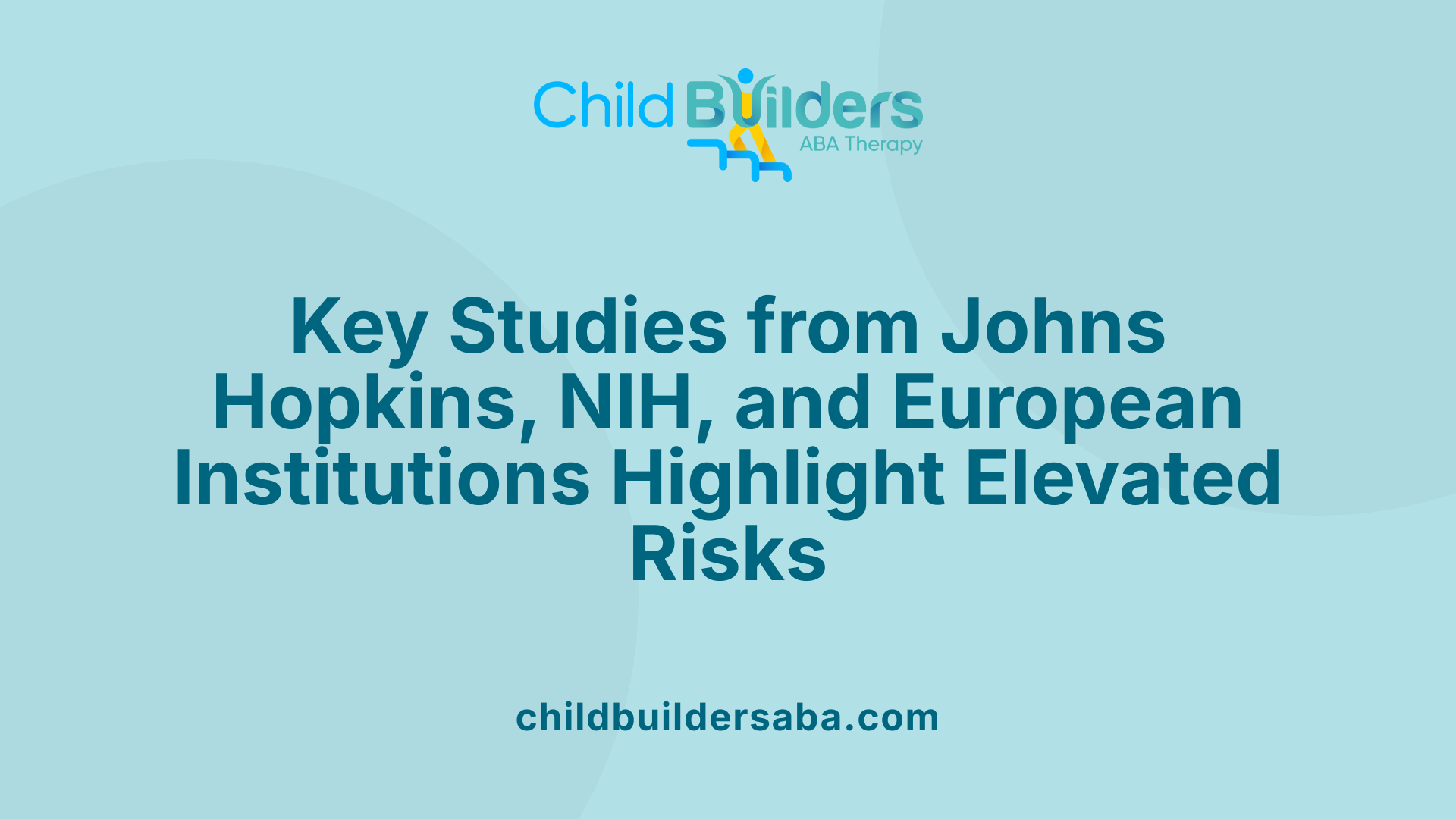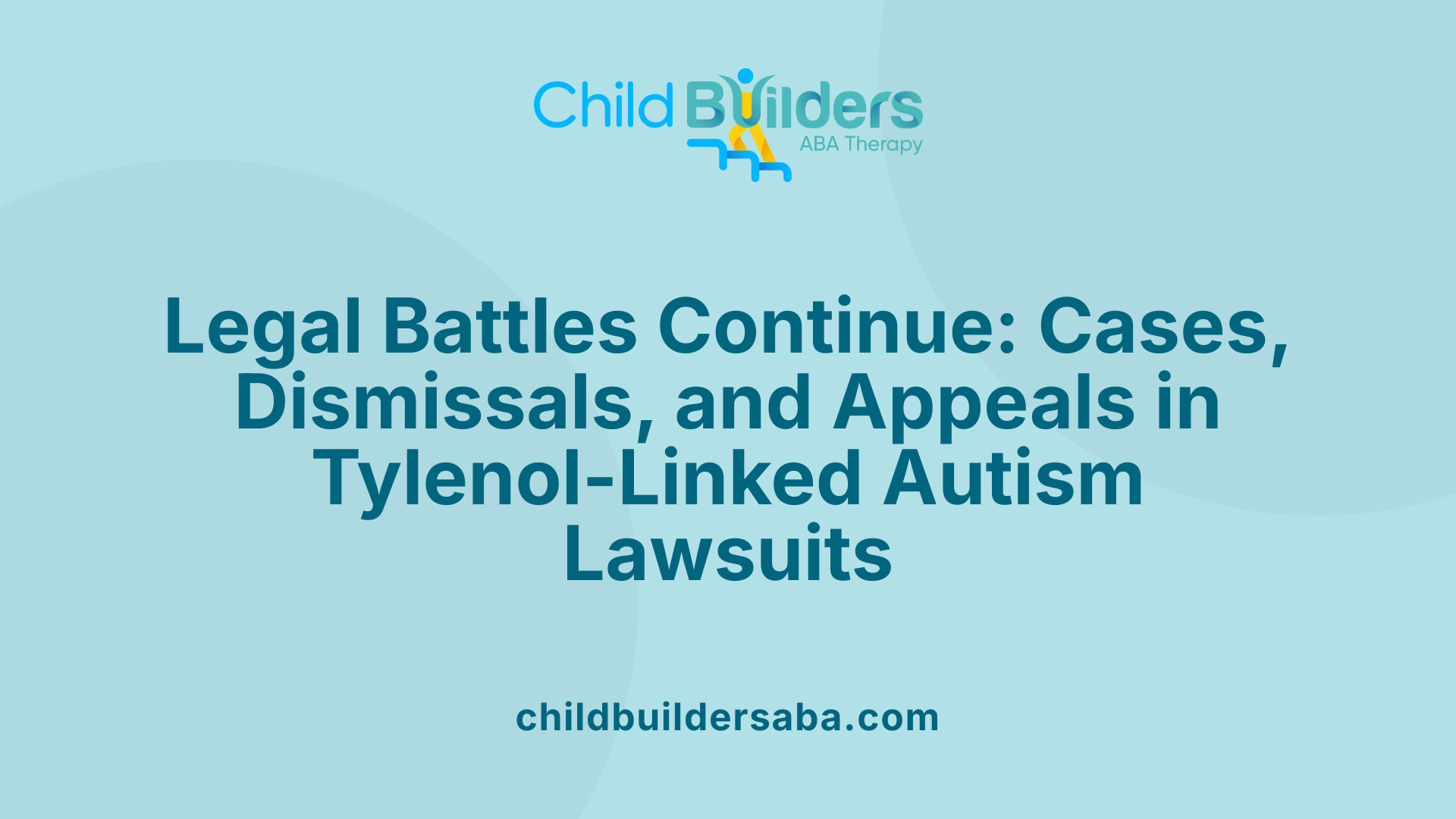Tylenol Autism Lawsuit

An Overview of the Controversy Surrounding Tylenol and Child Development
The link between Tylenol (acetaminophen) taken during pregnancy and potential developmental issues such as autism spectrum disorder (ASD) and ADHD has recently come under scrutiny. Growing scientific evidence, coupled with a wave of legal claims from affected families, has prompted a nationwide debate on safety, responsibility, and compensation. This article explores the scientific findings, ongoing litigation, legal options for families, and the broader implications for pregnant women and healthcare providers.
Background and Scientific Evidence Showing Potential Risks

Are there scientific studies linking prenatal acetaminophen exposure to neurodevelopmental disorders?
Multiple scientific investigations have explored the potential connection between using acetaminophen, commonly known as Tylenol, during pregnancy and the development of neurodevelopmental disorders in children. These studies have consistently indicated that prenatal exposure to acetaminophen may increase the likelihood of conditions such as autism spectrum disorder (ASD) and attention-deficit hyperactivity disorder (ADHD).
A range of epidemiological and animal research has provided strong evidence supporting this link. For example, studies from prestigious institutions like Johns Hopkins University and the National Institutes of Health (NIH) have shown that increased levels of acetaminophen in fetal blood are associated with higher risks of ASD and ADHD in children. Specifically, Johns Hopkins research published in JAMA Psychiatry found that children with detectable acetaminophen biomarkers at birth had roughly twice the chance of being diagnosed with ASD or ADHD.
Similarly, a 2021 study in the European Journal of Epidemiology reported that children exposed to acetaminophen in utero were about 19% more likely to develop autism and 21% more likely to exhibit ADHD symptoms. These findings reinforce earlier studies, including a 2014 report in JAMA Pediatrics, which indicated that children whose mothers used acetaminophen during pregnancy were 13-37% more likely to be diagnosed with ADHD or display related behaviors.
Is there a dose-dependent relationship between Tylenol use during pregnancy and increased risks of ASD or ADHD?
Research has also shown a dose-response pattern, meaning the higher or longer the exposure to acetaminophen during pregnancy, the greater the risk for neurodevelopmental issues.
According to studies, children whose mothers took Tylenol for more than 20 weeks of pregnancy had a 50% higher chance of developing ADHD. Additionally, the Cleveland Clinic reported that prolonged exposure correlates with a 20% increased risk of autism spectrum disorder.
A 2008 study highlighted that higher doses of acetaminophen were associated with increased autism risk, unlike other pain relievers such as ibuprofen. Moreover, UCLA research indicated that children with prenatal exposure to Tylenol had elevated risks of both ASD and ADHD, with risks increasing proportionally with the duration and amount of exposure.
What are the key scientific findings from Johns Hopkins University, NIH, and other institutions?
The collective evidence from Johns Hopkins, NIH, and other scientific bodies evidences a consistent pattern:
- Children with prenatal exposure to acetaminophen have about twice the risk of ASD and ADHD.
- Higher levels or longer durations of acetaminophen use during pregnancy are linked to increased risks.
- Animal studies suggest that acetaminophen can interfere with hormonal and brain development, providing biological plausibility.
- A 2021 study involving over 100,000 children showed a 19% increase in autism diagnosis and a 21% increase in ADHD symptoms following prenatal exposure.
The 2021 consensus statement published in Nature Reviews Endocrinology involved 91 scientists and warned pregnant women to avoid Tylenol unless medically necessary, emphasizing the mounting scientific concern.
| Study Source | Main Finding | Risk Increase | Notes |
|---|---|---|---|
| Johns Hopkins (2019) | Fetal biomarkers linked to autism and ADHD | 2.14 times ASD, 2.26 times ADHD | Based on umbilical cord blood analysis |
| NIH (2021) | Increased risks of ASD, ADHD, language delay, lower IQ | Up to 21% | Large cohort study |
| European Journal of Epidemiology (2021) | Elevated risks for ASD and ADHD | 19-21% | Exposure before birth |
| UCLA Study (2022) | Longer exposure raises ADHD risk | 50% more in prolonged cases | Involved over 20 weeks use |
Is Tylenol safe for use during pregnancy?
Despite the mounting scientific evidence linking prenatal acetaminophen exposure to neurodevelopmental risks, Tylenol remains generally considered safe when used properly. Medical and health authorities, including the American College of Obstetricians and Gynecologists, state that acetaminophen can be safely used during pregnancy at the lowest effective dose for the shortest duration.
This position is based on longstanding clinical experience and the fact that untreated fever and severe pain can themselves pose risks to fetal health. However, as research advances, concerns about potential subtle effects on fetal brain development have emerged.
The current consensus emphasizes cautious use. Pregnant women are advised to consult healthcare providers before taking Tylenol or other medications and to consider alternative therapies if appropriate.
In summary, while Tylenol remains an accessible over-the-counter medication, ongoing studies suggest that its use during pregnancy warrants careful evaluation to mitigate potential neurodevelopmental risks for children.
Search Query for More Information: scientific studies Tylenol pregnancy autism ADHD risks
Legal Landscape: Lawsuits and Class Actions
Overview of the Tylenol Autism Lawsuit and Multidistrict Litigation (MDL 3043) in the Southern District of New York
The legal situation surrounding Tylenol and neurodevelopmental disorders is primarily organized within a large-scale multidistrict litigation (MDL 3043) based in the Southern District of New York. This MDL consolidates numerous federal cases involving claims that prenatal exposure to acetaminophen, the active ingredient in Tylenol, may result in autism, ADHD, and other developmental issues.
The litigation process involves extensive discovery, expert testimonies, and scientific reviews to determine the potential causality. Recently, federal claims faced dismissal due to the exclusion of certain expert testimonies, but plaintiffs are appealing these decisions. Legal proceedings continue, with some cases progressing into trial and settlement negotiations.
A notable aspect of this litigation is the large number of affected families seeking accountability and compensation. Official estimates list over 100,000 victims in the class action, with settlement amounts projected to range significantly based on severity—some cases could reach over $500,000.
Claims Made by Parents Linking Prenatal Tylenol Exposure to Autism and ADHD
Parents involved in these lawsuits assert that Johnson & Johnson and other manufacturers failed to adequately warn consumers about the potential risks of taking Tylenol during pregnancy. They claim that exposure to acetaminophen in the womb caused their children to develop autism spectrum disorder (ASD) and ADHD.
Numerous studies back these claims, showing a dose-dependent relationship between prenatal acetaminophen use and increased risks of neurodevelopmental conditions.
Research indicates that children whose mothers used Tylenol for more than 20 weeks of pregnancy are 50% more likely to develop ADHD, according to UCLA research. Scientific findings also suggest that the risk correlates with higher exposure levels, especially later in pregnancy.
The Role of Scientific Evidence in Shaping Legal Proceedings
Science plays a crucial part in the ongoing legal actions. Multiple epidemiological and animal studies have strengthened the association between prenatal acetaminophen exposure and neurodevelopmental disorders.
For example, a 2021 study from Johns Hopkins found that children with higher prenatal acetaminophen levels in cord blood were over twice as likely to be diagnosed with ASD or ADHD. Similarly, a comprehensive meta-analysis published in the American Journal of Epidemiology in 2018 highlighted a 20-34% increased risk of autism and ADHD among children prenatally exposed to acetaminophen.
Moreover, international scientific consensus, such as the 2021 statement in Nature Reviews Endocrinology, warns pregnant women about avoiding Tylenol unless necessary due to potential risks. These scientific findings are central to the plaintiffs' cases, aiming to demonstrate causation and negligence.
| Aspect | Details | Supporting Evidence |
|---|---|---|
| Lawsuit Status | Ongoing multi-district litigation | Cases consolidated in MDL 3043 in NY, with ongoing appeals |
| Medical Claims | Prenatal Tylenol linked to autism and ADHD | Epidemiological studies, animal research, cord blood studies |
| Settlement Potential | Varies based on severity | Estimated from $50,000 up to over $500,000 |
| Scientific Support | Increased risks confirmed | Studies from Johns Hopkins, NIH, European Epidemiology, meta-analyses |
| Recent Court Actions | Dismissals and appeals | Summary judgments, expert testimony exclusions |
Are there ongoing class action lawsuits or legal claims against Tylenol manufacturers related to autism or neurodevelopmental disorders?
There are currently no active class action lawsuits or legal claims directly against Tylenol manufacturers related to autism or neurodevelopmental disorders. Nevertheless, accumulating scientific evidence suggests a possible link between prenatal Tylenol use and increased autism and ADHD risk.
Recent research from reputable institutions like Johns Hopkins emphasizes a significant association, with some children exposed in utero being up to three times more likely to be diagnosed with these conditions. The 2021 consensus statement published in Nature Reviews Endocrinology also expressed concern, urging caution with Tylenol use during pregnancy.
In addition, a law firm in Canada, Merchant Law Group LLP, is preparing a class action claim against Johnson & Johnson, representing families whose children were diagnosed with neurodevelopmental conditions after prenatal Tylenol exposure. Despite this, no formal lawsuits have yet been filed or actively prosecuted against Tylenol manufacturers within the United States legal system.
This evolving legal and scientific landscape continues to be closely monitored, with many advocating for greater awareness, warning labels, and further research to clarify causation and liability.
Legal Options for Families and Affected Individuals
How parents and guardians can join existing lawsuits or initiate their own claims.
Families affected by neurodevelopmental disorders such as autism or ADHD that they believe are linked to prenatal Tylenol use have several legal avenues to pursue compensation. Currently, many of these cases are consolidated in a Multidistrict Litigation (MDL) in the Southern District of New York, designated as MDL 3043. This consolidation simplifies the process by grouping similar claims, allowing affected families to join ongoing lawsuits without needing to file individual cases initially.
Parents can also consider initiating their own claims if they prefer to pursue separate legal action. To do so, they should consult an experienced personal injury or product liability attorney specializing in pharmaceutical litigation. These attorneys can assess the specifics of each case, review evidence, and guide families through the process of filing a claim. Typically, eligibility involves establishing that the child was exposed prenatally to Tylenol and was subsequently diagnosed with autism, ADHD, or related neurodevelopmental disorders.
Legal representation often involves working on a contingency fee basis, meaning families do not pay upfront legal costs. Instead, lawyers are paid a percentage of any awarded damages, which can range significantly depending on the case's circumstances and evidence.
Documentation requirements and evidence for filing a claim.
Filing a successful claim requires detailed documentation and evidence to demonstrate the link between Tylenol exposure and the child's condition. Key documents include:
- Medical records confirming the child's diagnosis of autism, ADHD, or related conditions.
- Maternal medical records documenting Tylenol use during pregnancy, including dosage, frequency, and duration.
- Laboratory and laboratory reports showing levels of acetaminophen exposure, if available.
- Evidence of the child's developmental history and any prenatal complications.
- Expert medical and scientific testimony linking Tylenol use to the neurodevelopmental disorder.
Gathering robust evidence is crucial to establish causation and support failure to warn claims against manufacturers such as Johnson & Johnson. An experienced lawyer can assist families in collecting, reviewing, and submitting these documents effectively.
Potential damages and compensation ranges, including medical expenses, pain and suffering, and punitive damages.
The damages sought in these lawsuits can encompass a wide variety of harm experienced by the affected children and their families. These include:
- Medical expenses for ongoing treatments, therapies, and medications.
- Compensation for lost wages and income due to caregiving responsibilities.
- Pain and suffering endured by the child and affected family members.
- Punitive damages, where applicable, aimed at punishing negligent conduct.
Estimates of settlement amounts vary based on the severity of the child's condition. For example, compensation could range from approximately $50,000 for less severe cases to over $500,000 or even over $2 million for more serious autism diagnoses or lifelong disabilities.
Legal outcomes and settlement awards are influenced by factors such as the strength of scientific evidence, the specific circumstances of exposure, and the extent of damages incurred. Families are encouraged to work with experienced legal counsel to maximize their potential for fair compensation.
| Legal Action Step | Details | Additional Notes |
|---|---|---|
| Join existing MDL | Through court-approved procedures, families can become part of consolidated lawsuits | Simplifies collective legal process |
| File individual claim | Based on personal evidence, with legal help, families can pursue separate lawsuits | May differ in damages awarded |
| Evidence collection | Gather medical records, exposure details, expert testimonies | Critical for successful claims |
| Potential compensation | Ranges vary; from $50,000 to over $2 million, depending on severity | Affected by case specifics |
How to access further information and legal support
Interested families should consult reputable law firms experienced in pharmaceutical litigation, such as Keller Postman, which is actively reviewing and pursuing Tylenol autism lawsuits nationwide. Legal professionals can provide guidance on eligibility, documentation, procedural requirements, and potential outcomes.
To keep informed about ongoing proceedings and new developments, families can also search online using relevance queries like 'legal options Tylenol pregnancy autism lawsuit' or visit dedicated legal websites focusing on mass torts and product liability cases. Staying proactive and informed can significantly impact the success of pursuing compensation for affected children.
Current Litigation Status and Court Proceedings

What is the current status of lawsuits alleging a link between Tylenol use during pregnancy and autism or neurodevelopmental disorders?
Ongoing legal actions across the United States strongly suggest that many families believe prenatal Tylenol exposure may be related to their children’s neurodevelopmental conditions, specifically autism spectrum disorder (ASD) and ADHD. These cases are grouped into a comprehensive multi-district litigation (MDL 3043) in the Southern District of New York. The MDL consolidates numerous federal lawsuits with similar claims, streamlining legal proceedings and scientific review.
Recent court developments have included significant rulings affecting the progress of these cases. For instance, in September 2024, a court granted summary judgment, which effectively dismisses some claims based on current evidentiary standards. Notably, some federal claims have been dismissed due to the exclusion of certain expert testimonies, a move that influences the overall trajectory of the litigation.
Despite these setbacks, many cases are still active and progressing. Several plaintiffs are appealing the court's decisions, maintaining that scientific evidence supports a causal link between prenatal acetaminophen exposure and neurodevelopmental disorders. Additionally, numerous state court cases have been filed, adding to the total number of litigations and potential claims.
Exploring future developments, legal analysts anticipate continued discovery phases where scientific studies, expert testimonies, and medical records will be scrutinized. Settlement negotiations are also underway, with potential payouts varying significantly based on the severity of each child's condition. For less severe cases or mild diagnoses, settlements might be around $50,000. Conversely, more serious cases with extensive medical needs could see settlements exceeding $500,000.
Overall, the litigation landscape remains complex and dynamic, with ongoing appeals, procedural motions, and evolving scientific evidence shaping its course. The litigation's resolution will likely depend on future court rulings, settlement negotiations, and possible legislative interventions.
Scientific Research and Expert Opinions
What scientific research exists regarding the potential link between Tylenol (acetaminophen) use during pregnancy and autism spectrum disorder (ASD) or ADHD?
Recent scientific investigations into the connection between prenatal acetaminophen exposure—commonly known as Tylenol—and neurodevelopmental disorders such as autism spectrum disorder (ASD) and attention-deficit hyperactivity disorder (ADHD) have produced a range of findings.
A number of observational studies suggest that higher levels of acetaminophen detected in umbilical cord blood are associated with an increased risk of ASD and ADHD. For instance, Johns Hopkins University research indicates that children with elevated cord plasma biomarkers of fetal acetaminophen exposure were approximately twice as likely to be diagnosed with ASD or exhibit ADHD-like behaviors. Similarly, a 2021 study from the European Journal of Epidemiology reported that children exposed to acetaminophen prenatally had about a 19% increased likelihood of autism diagnosis and a 21% higher chance of showing signs of ADHD.
Animal studies have also contributed to understanding potential mechanisms. Research suggests that acetaminophen acts as an endocrine disruptor, interfering with hormonal pathways critical for brain development. These studies provide biological plausibility for the observed associations.
However, the picture is complex. Large epidemiological studies and systematic reviews, including meta-analyses, have often found weaker evidence of causality. For example, a 2018 meta-analysis published in the American Journal of Epidemiology concluded that prenatal exposure to acetaminophen was associated with a 19% increased risk of autism and a 34% increased risk of ADHD. Despite these associations, confounding factors—such as maternal illness or other medication use—may influence outcomes.
More recent, rigorous research has aimed to clarify these links. Systematic sibling control studies from Sweden have not found consistent evidence supporting a causal link. These studies compare siblings exposed and unexposed to acetaminophen, controlling for shared genetic and environmental factors. Their findings often suggest that observed associations may be due to confounding rather than a direct cause-effect relationship.
Adding to this complexity, a 2021 consensus statement published in Nature Reviews Endocrinology involved over 90 scientists and clinicians. The statement advised pregnant women to exercise caution when using Tylenol, emphasizing the need for more definitive research before establishing a causal relationship.
In summary, while some high-quality observational and biological studies suggest a possible link between prenatal acetaminophen exposure and increased neurodevelopmental risks, evidence for a direct causal relationship remains inconclusive. Continued investigation is essential to determine whether acetaminophen use during pregnancy is genuinely harmful or if the observed associations are primarily due to confounding factors.
Overall, current scientific consensus calls for cautious use of Tylenol during pregnancy and underscores the importance of consulting healthcare providers for alternative pain management options whenever possible.
| Study Type | Key Findings | Additional Details |
|---|---|---|
| Cord blood biomarker analysis | Elevated acetaminophen linked to higher ASD/ADHD risk | Johns Hopkins, 2019 |
| Meta-analysis (2018) | Increased risks: 19% for autism, 34% for ADHD | American Journal of Epidemiology |
| Sibling control studies | No causal link identified in some designs | Swedish cohorts, ongoing debates |
| Expert consensus statement | Recommends caution, need for further research | Nature Reviews Endocrinology, 2021 |
This body of scientific work underscores the importance of ongoing research to clarify true causality, guiding both medical advice and legal considerations surrounding Tylenol use during pregnancy.
The Role of Scientific and Legal Communities
How can parents or guardians qualify to join a lawsuit claiming that Tylenol contributed to autism or ADHD in their child?
To qualify for involvement in the Tylenol autism and ADHD lawsuit, parents or guardians need to meet specific criteria. Primarily, they must have used acetaminophen—commonly known by the brand name Tylenol—during pregnancy. This includes various generic brands sold at major retailers such as Walmart, Walgreens, CVS, and Rite Aid.
Additionally, their child must have received a clinical diagnosis of a neurodevelopmental disorder, such as autism spectrum disorder (ASD) or attention-deficit hyperactivity disorder (ADHD). Crucially, the child should be younger than 18 at the time of filing the lawsuit.
While these are basic eligibility requirements, prospective plaintiffs should be aware that establishing a direct scientific link remains complex. Courts have scrutinized expert testimony and scientific evidence, leading to some dismissals and ongoing challenges. The current legal landscape emphasizes the importance of comprehensive documentation.
Parents and guardians are encouraged to gather records of their medication use during pregnancy and their child's medical diagnoses. Consulting with legal professionals experienced in these mass tort cases can help determine eligibility and guide the process. Although many firms, such as Keller Postman, are reviewing potential claims, direct intake may be limited as the cases proceed through ongoing litigation phases.
Ultimately, if you believe your child's condition might be related to prenatal Tylenol exposure, seeking legal advice is a prudent step. Proper documentation of drug use and medical diagnoses is essential for evaluating your case and navigating the legal process.
For more information, search queries like "how to qualify Tylenol autism lawsuit" can lead to helpful resources and updated legal guidance.
Implications for Pregnant Women and Healthcare Providers
Is Tylenol safe for use during pregnancy?
Tylenol, whose active ingredient is acetaminophen, has long been considered a safe over-the-counter option for managing pain and fever during pregnancy. Most health authorities, including the American College of Obstetricians and Gynecologists, generally state that acetaminophen can be used during pregnancy when taken at the lowest effective dose for the shortest necessary duration. This guidance stems from the understanding that untreated fever during pregnancy can pose greater risks to fetal development.
However, recent scientific studies and legal cases have begun to shed light on potential risks associated with prenatal exposure to acetaminophen. Research from institutions like Johns Hopkins University, NIH, and others suggests a dose-dependent link between acetaminophen use during pregnancy and increased risks of neurodevelopmental disorders such as autism spectrum disorder (ASD) and ADHD.
One significant concern is that prolonged or high-level use of Tylenol later in pregnancy may influence fetal brain development. For example, some studies indicated that children exposed to acetaminophen in the womb were about twice as likely to develop ASD or ADHD, especially if exposure lasted more than 20 weeks of pregnancy.
Given this emerging evidence, medical professionals are encouraged to review current guidelines and consider these risks in their practice. Although Tylenol remains widely used by pregnant women, healthcare providers are increasingly emphasizing cautious use, recommending that it only be taken when necessary and after consulting a healthcare professional.
Potential changes in prescribing behaviors
Healthcare providers may become more conservative in their prescribing or recommending of acetaminophen during pregnancy. Some practitioners might prioritize alternative pain management strategies or suggest the minimal effective dose if Tylenol use is unavoidable.
In light of new research, there could also be increased scrutiny over off-label or prolonged use of acetaminophen by pregnant patients. Medical guidelines might evolve to include specific warnings or dosage recommendations aimed at reducing risk.
Additionally, providers might increase monitoring and counseling about medication use during pregnancy, focusing on the potential neurodevelopmental risks associated with common over-the-counter drugs like Tylenol.
Education on risks and safe medication use during pregnancy
Educating pregnant women on medication safety is currently a priority for healthcare providers. Emphasis is placed on understanding both the benefits and potential subtle risks associated with common medicines.
Parents-to-be should be advised to discuss any medication plans with their healthcare providers, avoiding unnecessary or prolonged use of Tylenol unless specifically indicated. Clear communication is essential to balance the need for symptom relief with the prudence required given the recent scientific findings.
Healthcare providers are also working to improve materials and counseling practices to inform women about the ongoing research and to dispel misconceptions.
In summary, while Tylenol continues to be an accessible and effective medication for many pregnant women, evolving evidence suggests the necessity for cautious use. Medical guidelines and prescribing behaviors may shift toward more conservative practices, prioritizing safety and informed choices. Education remains central to ensuring that pregnant women are aware of potential risks, empowering them to make informed decisions about medication use during this critical period.
Resources and Support for Affected Families
What resources are available for those seeking more information or legal assistance regarding potential health risks associated with Tylenol use during pregnancy?
Families and individuals concerned about the potential risks of Tylenol (acetaminophen) use during pregnancy can access a variety of resources to stay informed and seek support.
Healthcare providers are the first point of contact for personalized medical advice. Obstetricians, pediatricians, and other healthcare professionals can provide guidance based on the latest research and individual health circumstances.
Government agencies also offer valuable information. The U.S. Food and Drug Administration (FDA) maintains a website with updates on medication safety during pregnancy. The FDA’s resources help consumers understand the risks and benefits of various drugs, including acetaminophen.
The Centers for Disease Control and Prevention (CDC) and the National Institutes of Health (NIH) provide extensive research, educational materials, and support networks for families affected or concerned about neurodevelopmental disorders like autism and ADHD.
Legal resources are equally important for those considering legal action. Numerous law firms, such as Keller Postman, are actively involved in the ongoing Tylenol autism lawsuits. Prospective plaintiffs can consult legal aid organizations or hire specialized attorneys in product liability or healthcare law.
To ensure that decisions are made based on reliable information, it is recommended to verify the credibility of sources. Consulting with healthcare professionals and legal experts can help families understand their options, navigate the legal landscape, and access the necessary support.
Staying informed through credible sources and engaging with support networks can empower families affected by neurodevelopmental disorders linked to prenatal exposure to Tylenol.
Navigating the Future of Tylenol and Child Neurodevelopment
As scientific research continues to evolve and legal proceedings move forward, affected families are seeking clarity, accountability, and justice. The debate around Tylenol’s safety during pregnancy underscores the importance of ongoing research, improved warning labels, and informed decision-making for expectant mothers. While the legal landscape develops, it remains crucial for healthcare providers to stay updated on emerging evidence and for pregnant women to consult with their healthcare professionals about medication use. Support networks and legal resources are vital for families navigating these complex issues, as collective efforts aim to clarify causation, ensure safety, and provide restitution to those impacted.
References
- Tylenol Autism Lawsuit | Settlement & Claims (April 2025 Update)
- Tylenol During Pregnancy Autism/ADHD Lawsuit | Update 2025
- Tylenol Lawsuit Lawyer | Acetaminophen Autism Settlement
- Acetaminophen (Tylenol) Litigation - Keller Postman
- Join the Tylenol Acetaminophen Autism ADHD Lawsuits!
- Tylenol Autism Lawsuit | July 2025 Updates - Consumer Notice
- Tylenol Autism Lawsuit | October 2024 Update - Miller & Zois
- How Much is a Tylenol Autism Lawsuit Worth? - The Russo Firm





































































































